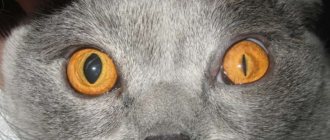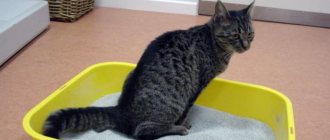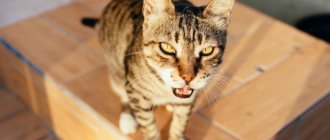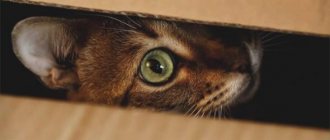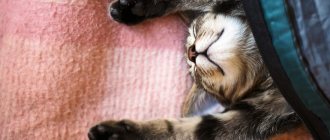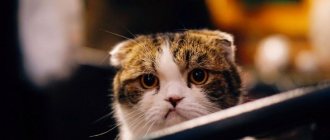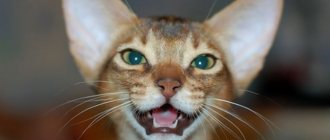Many cat owners and breeders often face this problem when a furry pet confuses day with night and becomes more active at night. Agree, it’s not very pleasant if, after a hard day at work, someone disturbs your sleep and peace, even if it’s your favorite cat. The inability to get a good night's sleep leads to irritation, decreased performance, and nervousness. Therefore, let's look at how to stop a cat from running around at night in a house or apartment? What to do if your pet makes noise, meows and keeps you from sleeping at night?
Attracts attention
Cats are social animals. They need enough human interaction. Having run around, the cat will calm down and go to rest in its favorite place. Nowadays, it is rare for people to have several pets at once, so you should devote enough time to your only furry pet. Moreover, he himself will let you know when he loses interest in communicating with the owner.
Why does a cat walk around the house and meow for no reason?
The reasons why cats start running around the house and meowing are varied and are not always a sign of developing health problems. Activity and constant meowing can be triggered by lack of physical activity, excess body weight, age, or the rehabilitation period after undergoing surgical manipulation.
If the cat's activity bothers the owner, it is a reason to contact a veterinary clinic for help. Thus, reduced activity can become a factor in the development of obesity. It is necessary to adjust the diet and encourage the pet to be active. Among the main reasons that lead to a cat running around the house and meowing are:
Hormonal imbalance - the onset of sexual heat in unsterilized cats and female cats provokes activity;
Disruption of the body’s functioning – pathologies of body systems that can cause increased activity and anxiety in a pet;
Change of place of residence - cats are animals with a delicate animal organization, so any stressful state can negatively affect general behavior.
Young cats, due to their young age, are very active, sociable and unusually playful, so they can run around the house at inappropriate times for the owner. In order to tame a kitten and establish its regime, you must have truly angelic patience.
Many cats are very sociable, despite the fact that they have a completely different reputation. Moreover, cats become attached to their owner, therefore, in the absence of attention from their owner, cats begin to direct attention to themselves in all sorts of ways. A cat running and meowing around the house, not receiving enough attention, is trying to encourage its owner to communicate. In addition, young cats are very energetic, although they spend most of their lives sleeping. Most of the time cats are awake, they begin to improve their hunting abilities. If a cat does not have the opportunity to run and jump during the day, it begins to splash out energy at night.
The following conditions can provoke this behavior in a cat:
- Feeling of hunger in both small kittens and adult cats. A cat may start screaming wildly when it is hungry and cannot satisfy it on its own. The stronger the pet experiences a feeling of hunger, the louder it makes itself felt, with screams and active movements. Most often, cats show anxiety with loud screams in the morning after waking up. In addition to hunger, a cat may experience thirst.
- Getting used to a new place of residence. A small kitten entering a new home may experience discomfort, so it shows its anxiety by meowing pitifully and wandering around the house.
- Demand to help. Most little kittens consider their owner to be the eldest in the pack, so they can ask for help when they cannot cope with the problems presented to them on their own.
- Danger warning. Cats love affectionate treatment, but when a threat appears, they may start screaming, meowing loudly or running away.
- An attempt to manipulate its owner. Domestic cats are real cunning, therefore, with the help of activity and loud screams, they can try to achieve what they want. A cat may beg for treats or forbidden foods, putting psychological pressure on its owner.
- Diseases. A cat can make loud mewing sounds when experiencing painful sensations. A pet may meow because it suffers from diseases of the urinary system (urolithiasis) or foreign bodies in the intestines. A cat meows invitingly and can ask its owner for help, indicating its unhealthy condition. It is necessary to promptly pay attention to your pet’s behavior, especially if there is a bowel disorder, loss of appetite, polydipsia, or a decrease or increase in temperature. It is recommended to contact a veterinary clinic for help.
In addition to the above reasons, requests for a walk can provoke such behavior in a cat. Without free access to the street, a cat may meow or scream invitingly, especially when the owner does not respond. The animal may become very frightened and experience stress due to this background. A cat can be frightened by the noise of a hair dryer or a car alarm. As soon as the pet calms down, the screaming and running around the house stops.
Boredom provokes strong screams at night in cats, especially when the house is immersed in silence. Cats are nocturnal animals, so they are most active at night. A meowing cat indicates that it is time to actively play or eat. In addition, cats also like to eat at night, so they can beg for food.
Activation at night in a cat is also provoked by the onset of sexual heat. During the period of estrus, cats begin to behave untypically, making loud sounds, notifying everyone in the area about the onset of sexual heat. Not only cats, but also males make loud noises, especially when they fight at night.
Purring and running around the house is a sign that the cat wants to talk to its owner. An animal can make sounds of different tones every day, wanting to communicate. The sounds made by the animal can be melodic or loud when the owner is talking on the phone. The most talkative cat breeds are Siamese cats, as well as Abyssinians, Orientals and Burmese.
If a cat runs around the house and meows, the reason may lie in strong anxiety before the birth process, especially if the pet is pregnant for the first time. The animal may become anxious, scream and run.
Being true predators by nature, cats can actively scream or run around the house if they sense prey. The hunting instinct, especially in cats living in a confined space, leads to the animal becoming nervous. Hunting for rats and cockroaches, flies and mice - makes the cat active, making fancy meowing sounds.
Overexcited
Often, as a result of active games with the owner, the cat can become overly excited, and it takes some time for him to calm down after this.
Therefore, the pet can behave hyperactively for quite a long time after the end of the game itself. If cases recur without the owner's participation, you should visit a veterinarian. Cats, like people, can suffer from nervous system disorders. Now there are many ways to bring an animal back to normal.
Correcting cat behavior
If the pet is absolutely healthy and is awake at night, the heart-rending meowing is not associated with any diseases or pathologies, using our recommendations and advice you can wean the cat from making noise at night.
If your cat runs around your apartment or house at night, organize a variety of active leisure activities for your cat. Buy toys that imitate the movements of animals and birds. They will help realize the hunting instinct, and the pet will be interested. Games with balls and wind-up mice will provide great entertainment for cats who love to chase prey. You need to play with your pet until you are sure that the animal is tired. Organize a play complex, climbing shelves, vertical supports with a platform, buy interactive toys.
Play with your pet an hour or two before bedtime, then feed him. It is best to give your cat chicken, beef, or any other meat food before a night's rest. After physical activity and a satisfying meal, cats usually go to bed.
Important! A well-fed, tired cat actually falls asleep quickly, but this does not mean that after a while the animal will not wake up and be active. So think about what you can do to interest your pet during the day. The more cats are awake during daylight hours, the less desire they will make to make noise and play at night.
If a cat is nervous, behaves restlessly, reacts inadequately to external stimuli, walks around the house at night, meows pitifully not only at night, but also during the day, it is possible that the cat is experiencing discomfort and pain due to an illness or worsened chronic pathology. Carefully observe the condition and behavior of your pet. If you notice symptoms of malaise or a deterioration in general condition, take the cat to the clinic for examination and diagnostic testing.
If your cat meows due to lack of affection or attention, pay him some attention before going to bed. Hygiene procedures can be useful for business. Comb the fur, clean the ears, and inspect the eyes. After a portion of affection and attention, making sure of the strength of the emotional connection, the cat will sleep sweetly until the morning.
Wants to “walk”
This applies to variants of absolute norms. The cat's natural desire to continue its breed can result in overly active behavior. Females also ask for a cat with a certain frequency. There are 2 solutions here:
- regular use of hormonal medications;
- castration or sterilization.
Owner's behavior after surgery. Surgical removal of genitalia procedures are performed quickly. But recovery will take some time. During this period, the animals are too weak and need special attention from the owner.
It is unacceptable to leave pets after surgery with sources of possible dangers, in particular water.
The toilet lid should always be down. Other containers must also be closed. In addition, it is important to take care of a balanced diet and avoid the development of obesity.
Why are cats active at night?
Cats by nature are incredibly inquisitive, quite energetic and cheerful creatures. Throughout the day, periods of wakefulness alternate with rest and sleep. But what if your pet is active at night when everyone is sleeping? To stop a kitten from running at night, you need to find out the root cause of this behavior.
As a rule, small kittens or energetic young cats show playfulness at night. While the owners sleep, inquisitive animals explore the world and explore their home. In most cases, such behavior is noted during the period of socialization and adaptation of the animal to new conditions. During the day, when no one is in the house, cats sleep in anticipation of “night games”, so their “day” begins with the onset of darkness or in the evening.
Important! Adult, elderly cats adapt to biorhythms, the schedule of their owners and sleep at night. Even if the pet wakes up at night, it does not necessarily mean that it will make noise; most likely, the cat is hungry or wants to get around its property.
Manifestations of night activity in cats manifest themselves in different ways. Some pets run around the apartment, climb all the heights, use various objects as toys, happily rolling them along the floor, and climb curtains. Others, after running around the house, climb into their owners’ beds, begin to bite their hands, and meow loudly. At the same time, maximum night activity is observed in the period from three to five hours.
Adult male cats can scream heart-rendingly at night during the rutting season. Typically, this behavior occurs several times a year, and especially in early spring.
Reasons for night wakefulness and activity in representatives of the cat family:
- the pet is hungry or there is no water in the bowl;
- the cat is worried or in pain;
- lack of physical activity during the day;
- the cat experienced severe stress, nervous shock;
- the pet attracts the attention of the owners.
If a cat is shy and there are other pets (cats, dogs) in the house, it tries to sleep during the day, hiding in secluded places to avoid unnecessary contact, and stays awake at night.
Also, do not forget that cats are excellent and very cautious hunters, so they prefer to go hunting at night. The hunting instinct makes cats very sensitive to sleep and dozing.
Animals hear and distinguish sounds that are elusive to the human ear. If the cat has shown activity, it is possible that someone has disturbed her sensitive sleep (a bird, a night moth).
The fastest cats in the world
Wild cats are fast and agile animals that are excellent hunters. Even a domestic cat can run at a speed of 40 km per hour. The pet will not be able to cover a long distance at this pace. He will be able to make a tiny leap. Wild cats have greater endurance, so they are able to run at high speed for much longer.
When measuring indicators, the distance and time it takes the animal to cover the distance are taken into account. There are many cats in nature that are capable of running with incredibly high agility.
Egyptian Mau
The fastest representatives of domestic cats are considered to be the Egyptian Mau (“Mau” means cat). The maximum record of these miniature darlings is acceleration to 58 km/h (over short distances). All zoologists claim that if these animals had larger dimensions, they could well compete with the cheetah for the title of the fastest animal on the planet.
Sixth place – Puma
The predator runs very quickly over short distances. The animal is capable of reaching speeds of up to 75 km/h. That is, a cougar can even catch up with a car that is not going too fast.
In the United States of America, the cougar is commonly called the “mountain lion.” The name is associated with the animal's habitat. The predator can be found not only in forests, but also in the mountains. Moreover, the puma is found even in the jungle and swamps.
Differs in large sizes. Together with the tail, the body reaches 2 meters in length. At the same time, the weight is not too large - from 50 to 100 kg. Much depends on gender and individual characteristics. Due to its well-developed muscles and light weight, the Puma is able to run quickly and hunt deftly.
Indoor and outdoor “runners”
Cats are far from running marathons; they are sprinters by nature.
It is quite logical that cats who live on the street, or who often find themselves there, need good athletic shape. They hunt birds and mice, which are not so easy to catch if you are physically unprepared. And most importantly, they often have to escape from dogs, otherwise they won’t survive. Domestic “fluffies” generally live freely - they only remember hunting as a game, when the owners offer them to catch a toy mouse or a bow on a string. Their bowl is always full, so there is no need to get food for themselves, and in general, the owners take care of everything. And you have to save yourself only from the master’s slipper.
In any case, a cat cannot run at high speed for long. If she does this to escape, she usually climbs a tree or otherwise hides from danger. But, if there is no shelter, then the animal may begin to suffocate and even die, since its heart is not adapted to such stress.
The fastest cats
What helps the fastest cats run
Among purebred cats, the Egyptian Mau is considered the record holder for speed. He was lucky with the structure of his hind legs, which have leathery folds at the base. Due to them, while running, the step reserve and amplitude of movements increase, and therefore the speed increases.
The normal speed of cats (on average) is 13.5-13.8 km/h. If a cat moves at a leisurely trot, then it will barely overtake a walking person, and its speed will be about 8 km/h. Whereas the maximum speed of cats is 50 km/h.

